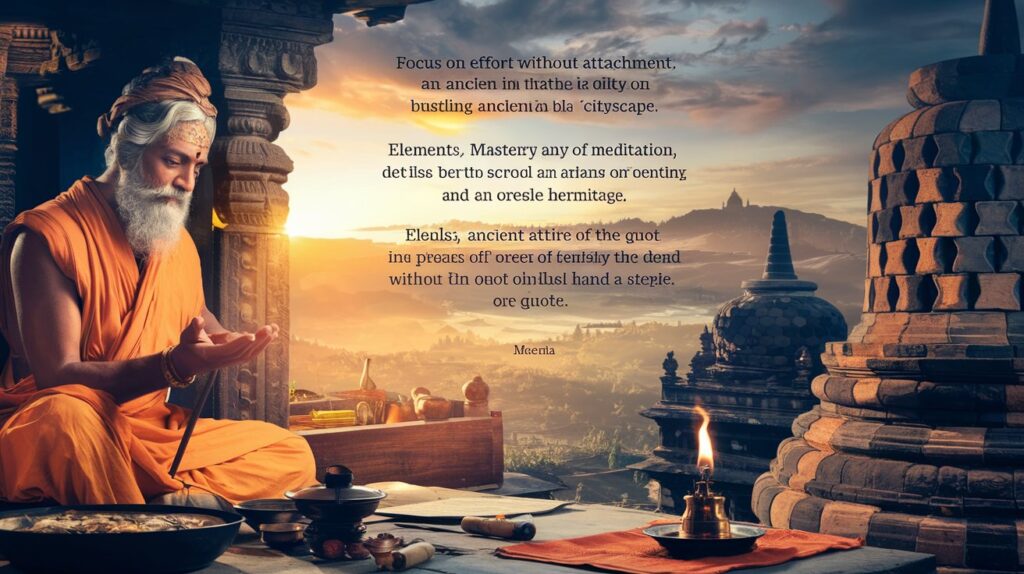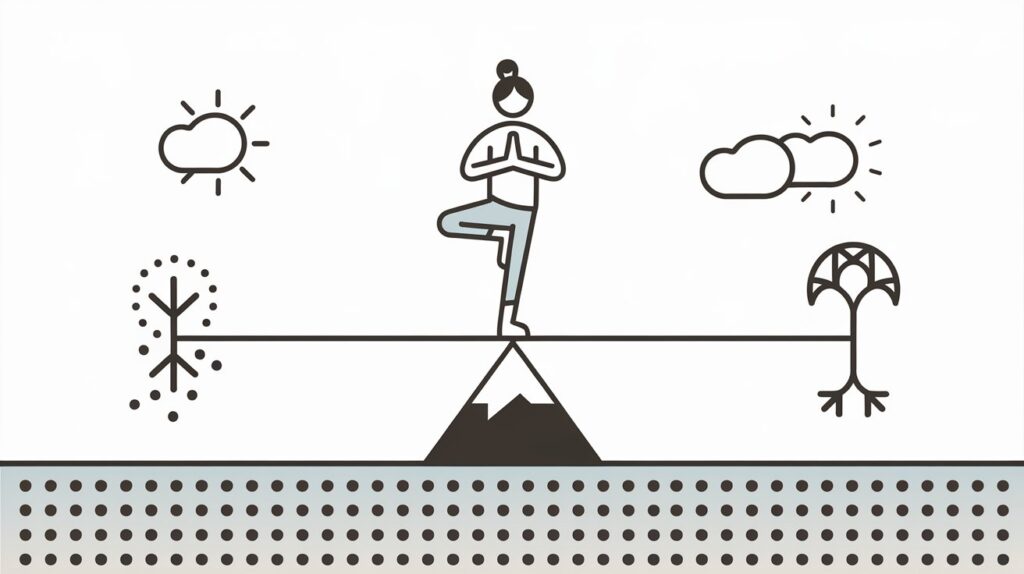This World Mental Health Day, embark on a journey through the profound teachings of the Vedas. Discover how ancient wisdom can guide you to holistic well-being, mental clarity, and inner peace. Let’s cultivate a balanced mind and enrich your life with these timeless practices.

In a world that never slows down, where the pressures of daily life often feel relentless, the quest for mental well-being has never been more urgent. We are constantly bombarded with information, expectations, and challenges, making it easy to overlook the crucial need for a balanced mind. But what if the secrets to true mental resilience and clarity were not just hidden in modern therapies but were also illuminated by ancient wisdom?
Imagine drawing upon the profound teachings of the Vedas, sacred texts that have guided seekers for thousands of years. These ancient texts offer timeless insights into achieving mental harmony and strength. They suggest that our mental well-being is not merely about managing stress or avoiding illness but about cultivating a state of inner peace, clarity, and resilience.
In this exploration of mental health, we will uncover why maintaining a healthy mind is essential for a fulfilling life, identify the symptoms of mental weakness, and reveal how the ancient wisdom of the Vedas can offer transformative guidance. By blending modern understanding with age-old principles, we can unlock the full potential of our mental resilience and lead lives enriched by clarity and balance.
The Vital Role of Mental Health

Mental health is the bedrock of a fulfilling life. It influences how we think, feel, and act. Good mental health enables us to handle stress effectively, build meaningful relationships, and pursue personal and professional goals with vigor. When our mental well-being is compromised, it can impact every facet of our lives, leading to emotional instability, cognitive difficulties, and physical health issues.
Recognizing Mental Weakness
Understanding the symptoms of mental weakness is crucial for addressing and managing mental health concerns. Common signs include:
- Persistent Anxiety: Chronic feelings of worry or panic, even in the absence of immediate stressors.
- Emotional Instability: Frequent mood swings, irritability, or overwhelming sadness.
- Cognitive Impairments: Difficulty concentrating, memory lapses, or impaired decision-making abilities.
- Social Withdrawal: Avoidance of social interactions and a loss of interest in previously enjoyed activities.
- Physical Symptoms: Unexplained aches, changes in sleep patterns, or fluctuations in appetite.

Ancient Wisdom for Mental Wellness
Imagine harnessing the wisdom of ancient sages to foster mental health in today’s world. The Vedas, India’s ancient sacred texts, provide timeless guidance on nurturing a resilient mind. Here’s how these age-old teachings can illuminate our path to mental well-being:

1. The Quest for Inner Peace
The Rigveda offers a powerful perspective on mental tranquility:
“अथ ते यथा शान्तिं वाचां मानं विदाश्वाम् / अश्वानः शान्तिं यथा न प्राशाः / मानानि व्याहृतानि मृषा सृञ्जावः / नाशा मामेकमाधिः।”
“As one finds peace in the speech, so let us attain peace of mind. Just as the horses move peacefully, let us move towards peace. Let us transcend the false and achieve the unity of the self.” (Rigveda 10.191.1)
This verse suggests that inner peace is not just a passive state but an active pursuit. Just as horses move harmoniously, we too should strive for a harmonious mind, transcending distractions and aligning with our true selves.
2. Strengthening the Mind

The Yajurveda provides a call to cultivate a strong, radiant mind:
“मनो नः शीर्षं वृष्णवः / मनो नः कृष्णं शरीरम् / मनो नः पूषः भासिः / मनो नः शुद्धिः शाश्वतीः।”
“Let our mind be strong, radiant, and pure. Let our thoughts be clear and enduring. May we be guided by wisdom and experience clarity of mind.” (Yajurveda 13.1)
This ancient wisdom underscores the importance of mental strength and purity. By focusing on clarity and resilience, we can fortify our minds against the turbulence of modern life.
3. The Power of Thoughts

The Atharvaveda highlights the transformative power of thoughts:
“या या वाचो भाषते नरः / या वा नामानि हानी / या वा कामो वृष्णवः / तां तां आयुर्विभूषणम्।”
“Whatever thoughts and words a person utters, whatever desires they have, may they be adorned with longevity and fulfillment. Let us embrace the wisdom that leads to mental strength.” (Atharvaveda 19.21.1)
This verse reveals that our mental health is intricately connected to our thoughts and desires. Embracing wisdom and positive intentions can enhance both our mental and physical well-being.
4. Harmonizing Life Force

The Chandogya Upanishad speaks to the harmony of life force:
“संस्काराः हि भूतानां प्राणः / प्राणो हि वायुः / वायोः शीर्षं पृथिवीः / पृथिवीः कामः / कामो नः सूर्यः / सूर्यः कामानाम् प्राणो नः।”
“The life force is the breath, and the breath is the vital essence. The essence of life is connected to desires and aspirations. May our life be guided by the light of wisdom and clarity.” (Chandogya Upanishad 4.3.6)
Here, mental health is seen as a reflection of our life force and desires. Balancing our aspirations and breathing techniques can lead to greater mental clarity and fulfillment.
5. Equanimity in Daily Life

Though not strictly Vedic, the Bhagavad Gita offers crucial insights:
“समत्वं योग उच्यते”
“Equanimity is called yoga.” (Bhagavad Gita 2.48)
This verse emphasizes the importance of maintaining mental balance. Equanimity, or mental calmness, is central to achieving true yoga (union) and overall mental health.
Integrating Ancient Wisdom into Modern Life
Incorporating these ancient practices into your daily routine can provide profound benefits for mental health:
Daily Meditation: Spend a few minutes each day practicing meditation or mindfulness to foster inner peace and clarity.
Finding time for daily meditation can be challenging, especially with a packed schedule. However, integrating a few minutes of mindfulness into your day is not only possible but can be highly effective in fostering inner peace and clarity. Here’s a practical guide to help you seamlessly add meditation to your busy routine:

1. Start Small and Be Consistent
Begin with just 2-5 minutes of meditation each day. Short sessions are easier to fit into a busy schedule and can be surprisingly impactful. Consistency is key, so aim to meditate at the same time each day to build a habit. Morning, lunchtime, or before bed are common times that might work well.
2. Use Available Breaks
Take advantage of short breaks throughout your day. Even brief moments of mindfulness can be beneficial. For instance:
- During Your Commute: If you use public transport, practice mindfulness by focusing on your breath or observing your surroundings with awareness.
- Between Meetings: Take a minute to center yourself before transitioning to the next task or meeting.
- During a Lunch Break: Spend a few minutes in a quiet spot, focusing on your breath or engaging in a quick meditation exercise.
3. Incorporate Meditation into Existing Routines
Blend meditation with daily activities you already perform:
- While Waiting: Use waiting times—whether it’s in line at the grocery store or waiting for a meeting to start—as opportunities for brief mindfulness.
- In the Morning Routine: Integrate meditation into your morning routine by spending a few minutes before or after brushing your teeth or while having your morning coffee.
- Before Sleep: Dedicate a few minutes to meditation before going to bed to help unwind and promote restful sleep.

- Stoic Reflection: Use journaling to reflect on daily experiences and responses to challenges, guided by Stoic principles of resilience and wisdom.
- Holistic Lifestyle: Adopt a balanced lifestyle inspired by Ayurveda, including mindful eating, regular exercise, and mental relaxation techniques.
- Ethical Living: Embrace Confucian virtues by fostering positive relationships, practicing self-discipline, and contributing to your community’s well-being.
- Mind-Body Practices: Explore practices like Qi Gong or Tai Chi to harmonize physical movement with mental relaxation.
In the quest for mental well-being, Part 2 of our series delves deeper into transformative techniques for nurturing your mind. Building on our exploration of integrating daily meditation, this section will provide an elaborate guide on how to effectively implement these practices into your busy life. Each technique is designed to cultivate inner peace, resilience, and clarity, offering you a holistic approach to mental wellness. Get ready to embark on a journey towards a more balanced and harmonious mind. Stay tuned
Conclusion
Mental health transcends the mere absence of illness; it embodies a state of holistic well-being that integrates the emotional, cognitive, and physical dimensions of our lives. True mental health is a harmonious balance, where each facet of our being works in concert to create a resilient and fulfilling existence. Recognizing the subtle signs of mental weakness is the first step towards cultivating this balance, but there’s more to the journey.

By embracing the profound teachings of ancient wisdom, we unlock a treasure trove of insights that can guide us toward a more balanced and enriched life. The Vedic texts, with their timeless messages, offer us a compass for achieving mental clarity, inner peace, and strength. They remind us that these pursuits are not fleeting goals but enduring quests that can profoundly transform our lives.
As we weave these ancient practices into our modern routines, we discover a path to resilience that’s both deeply rooted and remarkably relevant. The wisdom of the Vedas invites us to look beyond the superficial aspects of mental health and delve into the core of our being, fostering a state of well-being that is both profound and enduring.

Join us as we continue this journey, exploring how these ancient teachings can illuminate our path to a healthier, more balanced mind. Return to this space for further insights and practical guidance on integrating these timeless practices into your life. Together, let’s embark on a quest for mental clarity and fulfillment that enriches our lives and nurtures our deepest aspirations.
[…] Easy Tips for Better Mental Health! […]